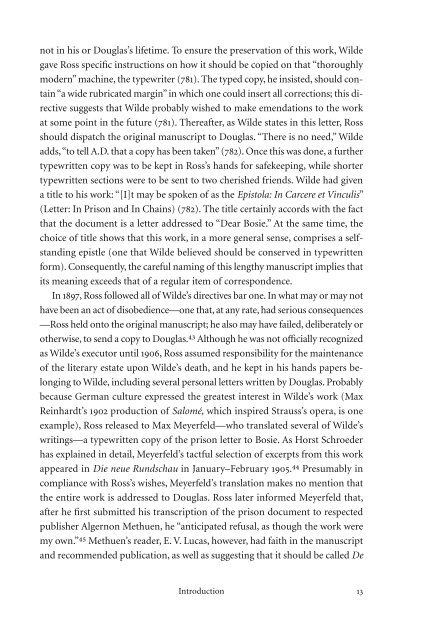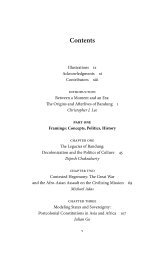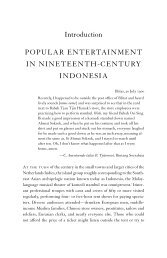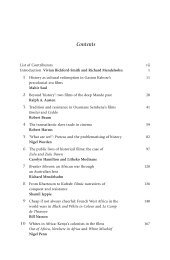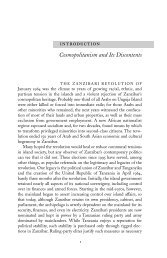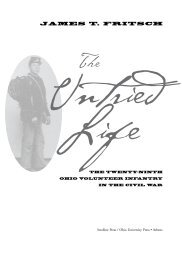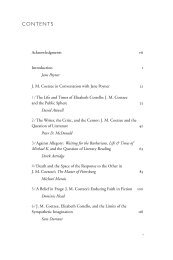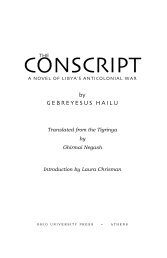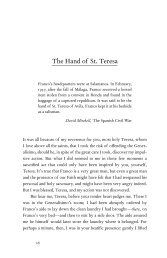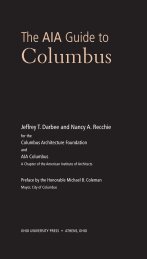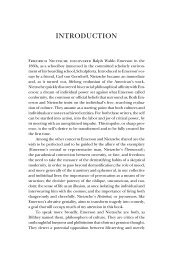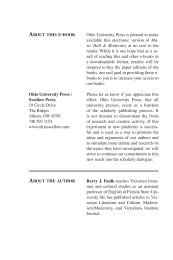Oscar Wilde and Modern Culture - Ohio University Press & Swallow ...
Oscar Wilde and Modern Culture - Ohio University Press & Swallow ...
Oscar Wilde and Modern Culture - Ohio University Press & Swallow ...
You also want an ePaper? Increase the reach of your titles
YUMPU automatically turns print PDFs into web optimized ePapers that Google loves.
not in his or Douglas’s lifetime. To ensure the preservation of this work, <strong>Wilde</strong><br />
gave Ross specific instructions on how it should be copied on that “thoroughly<br />
modern” machine, the typewriter (781). The typed copy, he insisted, should contain<br />
“a wide rubricated margin” in which one could insert all corrections; this directive<br />
suggests that <strong>Wilde</strong> probably wished to make emendations to the work<br />
at some point in the future (781). Thereafter, as <strong>Wilde</strong> states in this letter, Ross<br />
should dispatch the original manuscript to Douglas. “There is no need,” <strong>Wilde</strong><br />
adds, “to tell A.D. that a copy has been taken” (782). Once this was done, a further<br />
typewritten copy was to be kept in Ross’s h<strong>and</strong>s for safekeeping, while shorter<br />
typewritten sections were to be sent to two cherished friends. <strong>Wilde</strong> had given<br />
a title to his work: “[I]t may be spoken of as the Epistola: In Carcere et Vinculis”<br />
(Letter: In Prison <strong>and</strong> In Chains) (782). The title certainly accords with the fact<br />
that the document is a letter addressed to “Dear Bosie.” At the same time, the<br />
choice of title shows that this work, in a more general sense, comprises a selfst<strong>and</strong>ing<br />
epistle (one that <strong>Wilde</strong> believed should be conserved in typewritten<br />
form). Consequently, the careful naming of this lengthy manuscript implies that<br />
its meaning exceeds that of a regular item of correspondence.<br />
In 1897, Ross followed all of <strong>Wilde</strong>’s directives bar one. In what may or may not<br />
have been an act of disobedience—one that, at any rate, had serious consequences<br />
—Ross held onto the original manuscript; he also may have failed, deliberately or<br />
otherwise, to send a copy to Douglas.⁴³ Although he was not officially recognized<br />
as <strong>Wilde</strong>’s executor until 1906, Ross assumed responsibility for the maintenance<br />
of the literary estate upon <strong>Wilde</strong>’s death, <strong>and</strong> he kept in his h<strong>and</strong>s papers belonging<br />
to <strong>Wilde</strong>, including several personal letters written by Douglas. Probably<br />
because German culture expressed the greatest interest in <strong>Wilde</strong>’s work (Max<br />
Reinhardt’s 1902 production of Salomé, which inspired Strauss’s opera, is one<br />
example), Ross released to Max Meyerfeld—who translated several of <strong>Wilde</strong>’s<br />
writings—a typewritten copy of the prison letter to Bosie. As Horst Schroeder<br />
has explained in detail, Meyerfeld’s tactful selection of excerpts from this work<br />
appeared in Die neue Rundschau in January–February 1905.⁴⁴ Presumably in<br />
compliance with Ross’s wishes, Meyerfeld’s translation makes no mention that<br />
the entire work is addressed to Douglas. Ross later informed Meyerfeld that,<br />
after he first submitted his transcription of the prison document to respected<br />
publisher Algernon Methuen, he “anticipated refusal, as though the work were<br />
my own.”⁴₅ Methuen’s reader, E. V. Lucas, however, had faith in the manuscript<br />
<strong>and</strong> recommended publication, as well as suggesting that it should be called De<br />
Introduction 13


